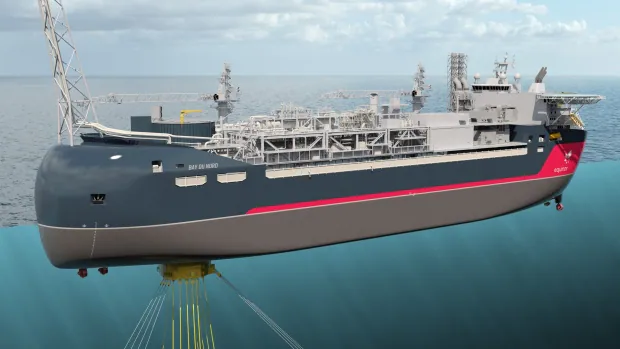
The federal government will formally approve the Bay du Nord offshore oil megaproject after markets close at 4 p.m. ET, CBC News has learned from multiple sources who are not authorized to speak publicly.
CTV was first to report the news.
Bay du Nord has been panned by environmental activists and climate scientists, who say it flies in the face of the federal government’s climate goals.
The project has also caused disagreement within Prime Minister Justin Trudeau’s Liberal cabinet. In February, Radio-Canada reported that cabinet members from Quebec, Ontario and British Columbia were opposed to its approval.
The Newfoundland and Labrador government has fiercely championed the project, with Premier Andrew Furey lobbying fellow Liberals for months.
Speaking to CBC News Wednesday, Furey wouldn’t confirm reports of formal approval by the federal government.
“I’m very hopeful that a decision is imminent,” Furey said. “I am very confident that our voice has been heard to the people making the decisions. The merits of the project stand for themselves.”
Norwegian oil company Equinor and its partners plan to develop the oil field at the Flemish Pass, about 500 kilometres east of St. John’s. Bay du Nord will be the first project to move the offshore oil industry into such deep waters, with drilling more than a kilometre underwater.
Their plan is to use a massive floating production, storage and offloading vessel, commonly known as an FPSO, capable of producing up to 200,000 barrels daily.
The project will be Newfoundland and Labrador’s fifth offshore oil field in production, and will begin producing as early as 2028.
Bay du Nord — seen as an economic lifeline to Newfoundland and Labrador, whose economy has been dependent on offshore oil royalties and labour — has been years in the making.
Equinor deferred the project in 2020 after oil prices plummeted in the early months of the COVID-19 pandemic, but announced it was forging ahead in 2021. The company says the project, which has not yet been officially sanctioned, will produce about 300 million barrels of oil, generate $3.5 billion in government revenues, and create thousands of jobs.
Environmental concerns
Federal Environment Minister Steven Guilbeault’s decision on whether Bay du Nord would proceed was originally scheduled for December, but was delayed until March 6.
Guilbeault missed that deadline too, and the federal government said it needed more time to assess whether the project is likely to cause “significant adverse environmental effects.”
The federal government last week released a climate plan that included measures to reduce emissions from oil and gas, but stopped short of limiting plans for production.
The N.L. government and proponents in the oil industry have touted the so-called “low-carbon” content of the oil that would be produced by Bay du Nord, calling the project a crucial part of a transition to renewable energy. Climate scientists and environmentalists have scoffed at the description.
Newfoundland and Labrador’s offshore does emit fewer emissions during extraction than other producers, but extraction only accounts for about 15 per cent of a barrel’s total emissions. When that oil is burned for energy, it produces just six per cent less carbon than diluted bitumen from Alberta’s oil sands.
The Intergovernmental Panel on Climate Change released a new report last week warning that the Paris Climate agreement goal of limiting global warming to 1.5 C above pre-industrial levels is all but out of reach. On Monday, UN Secretary General Antonio Guterres said investing in new fossil fuel infrastructure would be “moral and economic madness.”
On Wednesday, Furey said his government is still committed to achieving net zero emissions by 2050, but insisted Bay du Nord should be part of a transition to renewable energy. He also said he’d potentially support further projects by companies like ExxonMobil.
“We know that this is a time of transition. We know we have a valuable non-renewable resource but we equally need to transition to a renewable one,” Furey said.
Read more from CBC Newfoundland and Labrador




















Discussion about this post